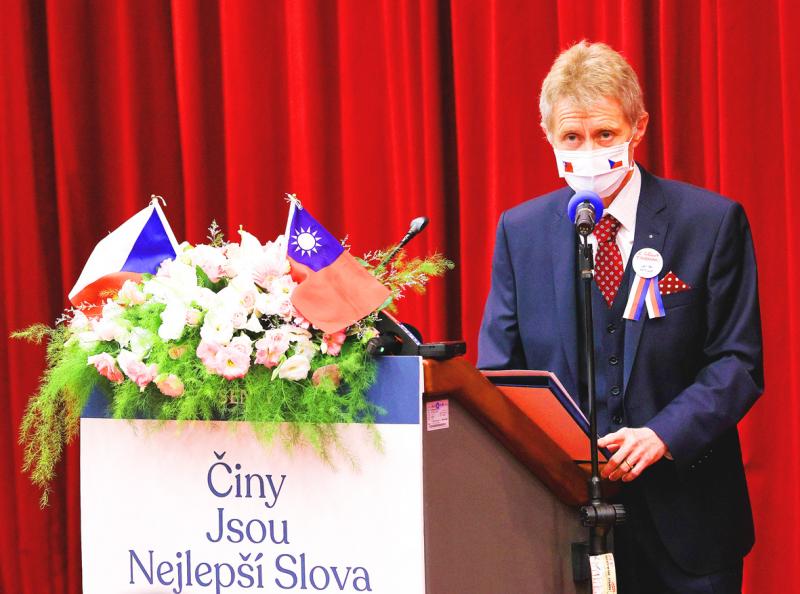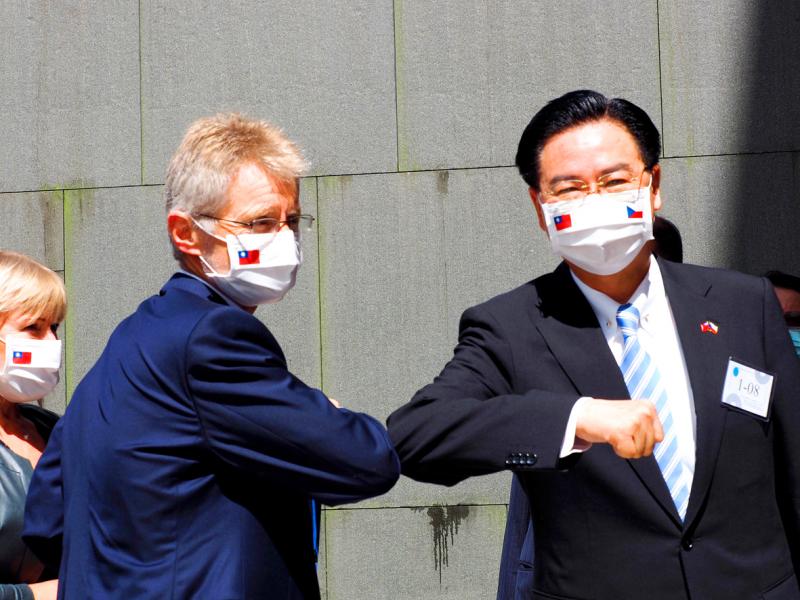Emphasizing the similarities between the Czech Republic and Taiwan, Czech Senate President Milos Vystrcil yesterday said that their most important common trait and biggest strength is that they “freely and voluntarily chose to live in a democracy.”
In a speech titled “Deeds Are the Best Words” at National Chengchi University in Taipei, Vystrcil said he admired Taiwanese for the “strength, courage and energy you invest in developing your beautiful islands, your freedom and democracy.”
Vystrcil said he regretted that a president of the Czech Senate had not visited Taiwan earlier, with his visit coming 16 years after one by the late Czech president Vaclav Havel.

Photo: CNA
Havel visited Taiwan in 2004, when he was no longer in office, and received an honorary doctorate from National Chengchi University.
“I am convinced that the other high-ranking political representatives of European democratic countries and the European Union itself will gradually start to realize their own democratic delay and will also visit Taiwan soon,” he added.
Drawing comparisons between the histories of the Czech Republic and Taiwan, Vystrcil said they have both “gone down a difficult path to win their freedom and democracy.”

Photo: David Chang, EPA-EFE
Students played central roles in both nations’ democratization process, he said, referring to the Velvet Revolution in the former Czechoslovakia, which began in November 1989, and the Wild Lily movement in Taiwan in March 1990.
He praised young people in both nations, specifically those involved in the Million Moments for Democracy in the Czech Republic and the 2014 Sunflower movement in Taiwan.
He also called on democratic countries to support each other, as well as other countries that are “fighting for their democracy or that may be threatened by the strong and the powerful.”
“It is our obligation to jointly support Hong Kong, and to jointly support a free Belarus,” he said.
Taiwan is a “prosperous, strong, free and democratic country that has to work harder to defend your freedom and democracy than we do in Europe,” he said.
“We understand you and we stand by you,” he added.
Vystrcil said he believed the “most important” common trait and the “biggest strength” possessed by the people of Taiwan and the Czech Republic is that they both “freely and voluntarily chose to live in a democracy.”
“Please be reminded that freedom, truth and justice are your best sword,” he said. “Please be reminded that freedom, truth and justice are also your best armor.”
“Please try your best to defend, and keep your sword and armor,” he added.
Vystrcil also praised Taiwan’s management of the COVID-19 pandemic, saying: “The world should learn from Taiwan.”
Vystrcil’s delegation, which includes Prague Mayor Zdenek Hrib, as well as political, business, scientific and cultural representatives, arrived on Sunday on a charter flight and is staying until Friday.
Chinese Minister of Foreign Affairs Wang Yi (王毅) yesterday said on the ministry’s Web site that Beijing would make Vystrcil “pay a high price for his short-sighted behavior and political speculation,” calling the visit a “provocation.”
Asked about China’s reaction, Vystrcil said that all members of the delegation joined the visit voluntarily and that they are doing the right thing.
In Prague, Czech Minister of Foreign Affairs Tomas Petricek said he would summon the Chinese envoy.
“I expect the Chinese side to explain those words [by Wang],” Petricek said. “Of course the journey has an impact on our relationships with China, but I think this has gone too far.”
The Czech government accepts the “one China” policy, but Vystrcil is a member of the right-wing opposition Civic Democrats and is not bound by the protocol.
Additional reporting by CNA and AFP

AGING: As of last month, people aged 65 or older accounted for 20.06 percent of the total population and the number of couples who got married fell by 18,685 from 2024 Taiwan has surpassed South Korea as the country least willing to have children, with an annual crude birthrate of 4.62 per 1,000 people, Ministry of the Interior data showed yesterday. The nation was previously ranked the second-lowest country in terms of total fertility rate, or the average number of children a woman has in her lifetime. However, South Korea’s fertility rate began to recover from 2023, with total fertility rate rising from 0.72 and estimated to reach 0.82 to 0.85 by last year, and the crude birthrate projected at 6.7 per 1,000 people. Japan’s crude birthrate was projected to fall below six,

US President Donald Trump in an interview with the New York Times published on Thursday said that “it’s up to” Chinese President Xi Jinping (習近平) what China does on Taiwan, but that he would be “very unhappy” with a change in the “status quo.” “He [Xi] considers it to be a part of China, and that’s up to him what he’s going to be doing, but I’ve expressed to him that I would be very unhappy if he did that, and I don’t think he’ll do that. I hope he doesn’t do that,” Trump said. Trump made the comments in the context

SELF-DEFENSE: Tokyo has accelerated its spending goal and its defense minister said the nation needs to discuss whether it should develop nuclear-powered submarines China is ramping up objections to what it sees as Japan’s desire to acquire nuclear weapons, despite Tokyo’s longstanding renunciation of such arms, deepening another fissure in the two neighbors’ increasingly tense ties. In what appears to be a concerted effort, China’s foreign and defense ministries issued statements on Thursday condemning alleged remilitarism efforts by Tokyo. The remarks came as two of the country’s top think tanks jointly issued a 29-page report framing actions by “right-wing forces” in Japan as posing a “serious threat” to world peace. While that report did not define “right-wing forces,” the Chinese Ministry of Foreign Affairs was

PREPAREDNESS: Given the difficulty of importing ammunition during wartime, the Ministry of National Defense said it would prioritize ‘coproduction’ partnerships A newly formed unit of the Marine Corps tasked with land-based security operations has recently replaced its aging, domestically produced rifles with more advanced, US-made M4A1 rifles, a source said yesterday. The unnamed source familiar with the matter said the First Security Battalion of the Marine Corps’ Air Defense and Base Guard Group has replaced its older T65K2 rifles, which have been in service since the late 1980s, with the newly received M4A1s. The source did not say exactly when the upgrade took place or how many M4A1s were issued to the battalion. The confirmation came after Chinese-language media reported